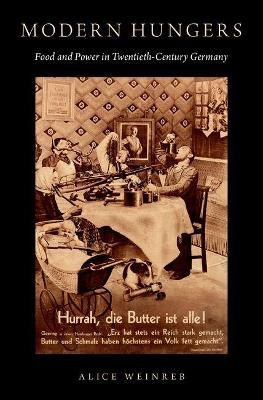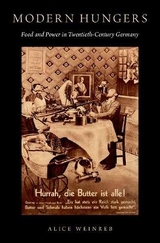Modern Hungers
Food and Power in Twentieth-Century Germany
Seiten
2017
Oxford University Press Inc (Verlag)
978-0-19-060509-4 (ISBN)
Oxford University Press Inc (Verlag)
978-0-19-060509-4 (ISBN)
Spanning World War I to the fall of the Berlin Wall, Modern Hungers shows how food and hunger have been central to economic policy, political identity, and everyday life in modern Germany. It historicizes contemporary issues ranging from the obesity epidemic to the gender-wage gap to famine relief.
During the first decades of the twentieth century, modern states fighting World War I and II for the first time experimented with feeding--and starving--entire populations. Within the new globalizing economy, food became intimately intertwined with waging war. In Europe, starvation claimed more lives than any other weapon of war. As Alice Weinreb shows in Modern Hungers, nowhere was this more apparent than in Germany, initiator and loser of both wars. The end of armed conflict in 1945 did not mean that such military strategies declined in significance. Fears of hunger and fantasies of abundance were instead reframed within a new political system that saw the world as divided between capitalism and communism. Divided Germany rapidly became the key European stage for the Cold War.
During the postwar decades, Europeans lived longer, possessed more goods, and were healthier than ever before. Nothing signaled this shift more clearly than the disappearance of famine from the continent. So powerful was the experience of post-1945 abundance that it is hard today to imagine a time when the specter of hunger haunted Europe, demographers feared that malnutrition would mean the end of whole nations, and the primary targets for American food aid was Belgium and Germany rather than Africa. Yet under both capitalist and communist systems, economic growth and political priorities proved inseparable from the modern food system. Drawing on sources ranging from military records to cookbooks to economic and nutritional studies from East and West German archives, Modern Hungers reveals similarities and striking ruptures in popular experience and state policy relating to the industrial food economy. It thus offers historical context for many key contemporary concerns ranging from humanitarian food aid to the gender-wage gap to the obesity epidemic.
During the first decades of the twentieth century, modern states fighting World War I and II for the first time experimented with feeding--and starving--entire populations. Within the new globalizing economy, food became intimately intertwined with waging war. In Europe, starvation claimed more lives than any other weapon of war. As Alice Weinreb shows in Modern Hungers, nowhere was this more apparent than in Germany, initiator and loser of both wars. The end of armed conflict in 1945 did not mean that such military strategies declined in significance. Fears of hunger and fantasies of abundance were instead reframed within a new political system that saw the world as divided between capitalism and communism. Divided Germany rapidly became the key European stage for the Cold War.
During the postwar decades, Europeans lived longer, possessed more goods, and were healthier than ever before. Nothing signaled this shift more clearly than the disappearance of famine from the continent. So powerful was the experience of post-1945 abundance that it is hard today to imagine a time when the specter of hunger haunted Europe, demographers feared that malnutrition would mean the end of whole nations, and the primary targets for American food aid was Belgium and Germany rather than Africa. Yet under both capitalist and communist systems, economic growth and political priorities proved inseparable from the modern food system. Drawing on sources ranging from military records to cookbooks to economic and nutritional studies from East and West German archives, Modern Hungers reveals similarities and striking ruptures in popular experience and state policy relating to the industrial food economy. It thus offers historical context for many key contemporary concerns ranging from humanitarian food aid to the gender-wage gap to the obesity epidemic.
Alice Weinreb is an assistant professor of history at Loyola University Chicago.
Acknowledgments
Introduction Modern Hungers in Modern Germany
1. The Geopolitics of Total War: Food in the First World War
2. Blood and Soil: The Food Economy and the Nazi Racial State
3. Hunger and the Remaking of History: Rationing, Suffering, and Human
Rights in Occupied Germany
4. Fueling Reconstruction: Production and Consumption in Divided Germany
5. Kitchen Debates: The Family Meal and Female Labor in East and West
Germany
6. Fighting Fat: Obesity and the Healthy Body in the Late Cold War
Epilogue Yes, We Have No Bananas: Negotiating Past and Future in Reunified Germany
Notes
Bibliography
Index
| Erscheinungsdatum | 14.05.2017 |
|---|---|
| Zusatzinfo | 23 hts |
| Verlagsort | New York |
| Sprache | englisch |
| Maße | 236 x 160 mm |
| Gewicht | 612 g |
| Themenwelt | Geschichte ► Allgemeine Geschichte ► Neuzeit (bis 1918) |
| Geschichte ► Allgemeine Geschichte ► Zeitgeschichte | |
| Geisteswissenschaften ► Geschichte ► Regional- / Ländergeschichte | |
| Geschichte ► Teilgebiete der Geschichte ► Wirtschaftsgeschichte | |
| Technik ► Lebensmitteltechnologie | |
| ISBN-10 | 0-19-060509-X / 019060509X |
| ISBN-13 | 978-0-19-060509-4 / 9780190605094 |
| Zustand | Neuware |
| Haben Sie eine Frage zum Produkt? |
Mehr entdecken
aus dem Bereich
aus dem Bereich
Europa 1848/49 und der Kampf für eine neue Welt
Buch | Hardcover (2023)
DVA (Verlag)
CHF 67,20
Giordano Bruno - ein ketzerisches Leben
Buch | Hardcover (2024)
C.H.Beck (Verlag)
CHF 41,85




